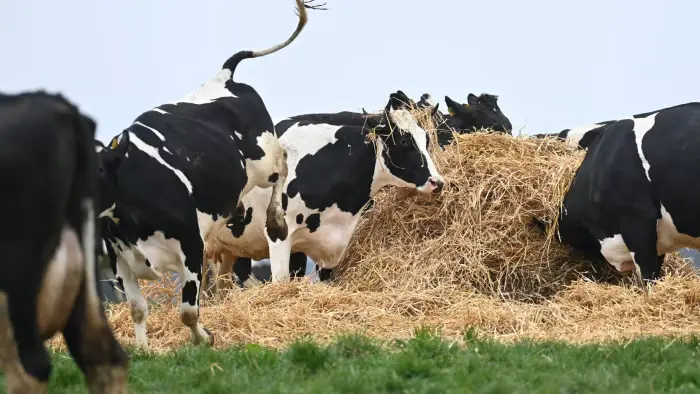Archived copies of the article: archive.today ghostarchive.org
first cow fart tax
Obligatory ummm akchually it’s the burps.
Wasn’t New-Zeeland first, by taxing emissions of cattle?
Reposting my deeper level comment as a top level comment…
Let’s do some math here…
100 / 365 ≈ €0.274 per day.
You really think that’ll put much of a dent in a farmer’s wallet?
Let’s do some more math. Let’s say they raise the price of a gallon of milk by €0.10. Nobody will bat an eye, they’ll just chalk it up to general inflation.
A good healthy dairy cow produces ~ 9 gallons of milk per day.
So, €0.10 * 9 = €0.90 per day extra, per dairy cow. That would actually yield the farmer an actual net gain of ~ €0.626 per day, per cow, subtracting the daily tax.
That would actually end up with the farmer gaining ~ €228.50 per year per cow, after the tax.
Ain’t nobody gonna bat an eye if they raise the cost of milk by €0.10 per gallon. Nothing will change, except the farmers will jack the prices around just enough that nobody cares and they actually profit from it.
This carbon tax, like most others, is designed so that the price is initially far below the damage done by the emissions, and it rises over time to encourage behavior changes. So no, I don’t expect it to initially make much difference. I do expect it to make a difference in the future though.
I just see it as a gradual way to slowly increase prices, at such a slow rate that people don’t tend to care, while both the farmers and the government collect more profit.
Nothing will change with such a slow method. Wanna make a difference and make a real change, just double the price of milk and beef overnight.
While a tempting logic, in my understanding of the dairy market this is not correct. To my knowledge, here in Finland the big retail chains initiate auctions for the milk contracts, which are highly competed. If a producer tries to raise the price, they will likely not sell any milk at all. On top of that, milk is an important loss leader for the retail chains. The price is kept as low as possible, and it might even be sold at a loss, to tempt customers who will then compensate for this loss with the rest of their shopping basket. Against this, it would be very incorrect to assume that nobody bats an eye if the price of milk increases ten cents.
If the competition is that high, the farmers will have very low profit margins. Any extra expense needs to be added to the price.
This won’t affect competition much, as all farmers have the same tax and therefore the same need for increased price.
The only noteworthy thing I see here (based on your information) is that the extra tax is per cow, but the price increase will be on the milk. This will hit farmers with lower amount of milk per cow. I guess this is farmers with more focus on quality and animal welfare.
I wanna know who uses the Euro and sells milk in gallons, heh.
We do need some bananas for scale, yes.
The percentages of my math still add up. Who TF is gonna bat an eye at €0.10 or $0.10 price increase?
You’ve got it all wrong, the farmers will pay, the prices go up, they still lose 100 bucks a cow, and the milk company makes the extra .10 a gallon. Capitalism in action.
That scenario doesn’t sound too far off base either. Still, nobody gonna bat an eye with a €0.10 increase, while either/or the government, the farmers, or the milk compamy CEO just gain profits.
it’s the huge commercial farming that’s the problem. Feeding grains and such making the gas worse for the animals. Smaller grass fed farms shouldn’t be included in the tax.
The problem is the bacteria cows use to digest cellulose. That’s not really changed by grass-feeding the animals. What’s needed is to sharply reduce the total quantity of cattle; the only way going to small grass-fed farms is going to make a big difference is to stop raising as many animals.
deleted by creator
This is a very tiny step, like a cow calf rising up and making a step right before they’re abducted to a veal crate/cage far away from their distressed mother.

Ah yes, that’ll reduce emissions, TAXES!!!
/s
Unironically yes? Taxing emissions makes it expensive to emit and will cause companies to reduce them
No, it’ll just end up raising the cost of milk and beef. The cows are still gonna fart and burp at the same rate, they don’t give a fuck about taxes.
That’s also a good thing - eating less milk and beef is also good for the environment. Less demand means fewer cows, means fewer cow farts…
Cows don’t just magically disappear when there’s less demand. They need to regulate the farmers cattle breeding rate, and place hefty fines on them for exceeding that rate.
A measly €100 per cow per year ain’t gonna do all that much, they can pay that off with just a few days worth of milk from the cow.
And then still turn around and jack the price of milk up beyond the rate of their losses, and the farmers might likely end up profiting even more, despite the tax.
And raising the price on a good does what to the demand…?
C’mon, think back to your high-school economics class. I’m sure you can get the answer.
Lol. They don’t teach actual economics in high school. That is a huge problem.
People pay ridiculous prices for name brand products that they don’t even need. $800 for a phone, no problem. $2500 for a TV, no problem.
If the little brats want some milk for their cereal, well mom is gonna just go out and buy a gallon of milk, even if it costs $20, just to shut the kids up.
Might as well throw common sense economics out the window when everyone and their cousin thinks they need that fancy 62 inch curved screen 8K television, PlayStation 5, the latest MacBook and iPhone, etc.
People piss money away on useless shit, you think the cost of a gallon of milk or a steak is gonna make a huge impact. Yeah sure, it’ll make a little impact, but I don’t think it’ll be as drastic of an impact as you’re thinking.
Translation: “The law of supply and demand isn’t a thing because it conflicts with my cynical magical thinking!”
The only practical way they’re gonna reduce emissions from cows is to reduce the number of cows. How do you do that? Place restrictions on farmers breeding cows, place hefty fines on farmers that exceed those restrictions, and eat more cows.
Taxing the farmers a measly €100 per year per cow isn’t gonna do all that much. You have any idea how much a good healthy cow is worth? Especially dairy cows, they just keep on delivering milk, for years.
That’s basically my point, taxing the farmers what adds up to chump change in the cattle industry is not going to reduce the number of cattle.
How do you do that?
By making beef more expensive so that fewer people want to buy it. We’ve been over this three times already.
You know dairy/beef cows don’t exist regardless of farms, right? They’re bred for the industry. Tax means higher price, higher price means lower demand, lower demand means they won’t be breeding as many cows.
I did some math on it, and all the farmers have to do is increase the price of a gallon of milk by €0.10, and they’ll not only be able to cover the tax, they’ll actually profit around €228.50 per year.
Nobody is gonna care about a measly €0.10 price increase, they’ll just chalk that up to general inflation. While both the government and the farmers end up profiting.
Here’s a link to my math breakdown comment…
Prett sure the plan is to gradually increase tax to give the farmers time to pivot to something more environmentally friendly
Plans can sound great on paper, but I don’t think this one is gonna accomplish much, especially at such a low and gradual rate.
When people go to buy milk, and see that it went up 10 cents, they’ll just be like ‘aw fuck, lemme dig out another dime’
When people go to buy steak, they probably won’t care much if it went up 50 cents, steak is already expensive.
People are already accustomed to gradual price increases, and it barely affects people’s habits, or appetite in the case of foods.
Raising the cost will reduce demand, and prompt producers to either reduce supply to avoid overproduction or find a way to keep costs down.
In first case, there will be less cow farts, and less meat and milk on the tables of poor people. There will be public health consequences, but emissions will be reduced.
In the second case, the government will get more taxes, emissions will be the same, and there will be possible public health issues due to lower meat/milk quality resulted from cost cuts.
In both cases, big manufacturers will likely keep their profits, small farmers will be impacted more and may go out of business, and public health will be at risk.
Where am I wrong? I have no economic expertise and no data, and the government should have both, at least in theory.
I did some math and logistics on the subject. Rather than repost it again, I posted it as a top level comment in this thread.
Not actually trying to argue just curious because I haven’t been thinking about how to help with agricultural emissions. What could be a better solution?




